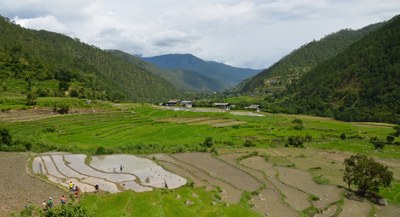100 % Organic Farming in Bhutan – a Realistic Target?

Foto: Arndt Feuerbacher
Bhutan, the small kingdom in the eastern Himalayas, is mainly known for its unique philosophy by the name of Gross National Happiness. It has also drawn international attention with its announcement in 2012 to be the first country to fully convert to organic agriculture by 2020. A team of researchers at the Humboldt-Universität zu Berlin (HU) has carried out a study on this policy target. It has now been published in the journal PLOS ONE.
Small farmers make up half of the population of this mountainous country, the majority of whom are already working without agricultural chemicals. “However, the banning of chemical fertilisers and crop protection agents would still affect one in three farmers”, says agricultural economist Arndt Feuerbacher, lead author of the study. “For conventional farmers this would mean an average drop in yields of 24 percent and it would particularly affect the cultivation of rice and potatoes.” According to the study, a conversion would reduce agricultural production by about 15 percent.
This would not only be due to lower yield, but also an increase in workload, such as mechanical weed control. The authors were not able to determine the ecological benefits of the complete changeover, but given the already very limited use of agricultural chemicals today they consider it to be relatively low. The decline in production would increase Bhutan’s dependence on food imports from India.
“From a macroeconomic point of view, the strong links with the Indian market make the full conversion possible”, says Prof. Dr. Harald Grethe, co-author and professor of International Agricultural Trade and Development at the HU, and adds: “It would, however, be in conflict with other policy targets in Bhutan, such as the increase in food self-sufficiency due to political dependencies.”
Knowledge and practices about organic farming currently still low
The study authors emphasise that the existing organic farming practices of most of the farmers in Bhutan are insufficiently developed, and the government should provide more support. Sabine Zikeli, co-author and managing director of the Zentrum Ökologischer Landbau (centre for organic farming) at the University of Hohenheim, explains: “This is especially important for soil fertility, because so far low quantities of cattle farm manure are used, and green manure and leguminous crops for nitrogen supply are scarcely considered for crop rotation.”
Furthermore, so far Bhutan has not been able to establish a market for its organic products, which would be especially relevant for agricultural export goods. The country places much hope on the 100-percent target’s impact on tourism. After all, a fully organic agriculture fits very well with the image of this Buddhist and environmentally aware country. But that is still a long way off. The government realises this, and is already considering to move the target from 2020 to the year 2030.
More information
Study: Is Bhutan destined for 100% organic? Assessing the economy-wide effects of a large-scale conversion policy Authors: Arndt Feuerbacher, Jonas Luckmann, Ole Boysen, Sabine Zikeli, Harald Grethe
Published: PLOS ONE, 13th Juni 2018, in Open Access
Website International Agricultural Trade and Development (HU)
Contact
Arndt Feuerbacher
Albrecht Daniel Thaer - Institute of Agricultural and Horticultural Sciences
International Agricultural Trade and Development
Tel.: 030 2093-46328
arndt.Feuerbacher@hu-berlin.de
